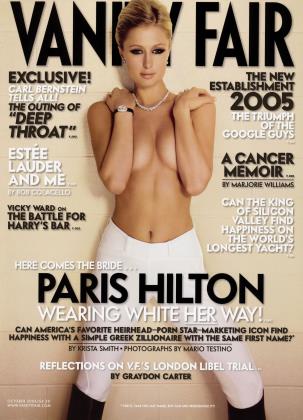Sign In to Your Account
Subscribers have complete access to the archive.
Sign In Not a Subscriber?Join NowIn high-alert London, the author has a fistful of party invitations, a surprise meeting with Lord Conrad Black, and champagne with Lady Colin Campbell, whose novel upset Lily Safra so much that the powerful widow forced the book's publisher to pulp it. But Lady Colin Campbell is fighting back
October 2005 Dominick Dunne Jason BellIn high-alert London, the author has a fistful of party invitations, a surprise meeting with Lord Conrad Black, and champagne with Lady Colin Campbell, whose novel upset Lily Safra so much that the powerful widow forced the book's publisher to pulp it. But Lady Colin Campbell is fighting back
October 2005 Dominick Dunne Jason Bell View Full Issue
View Full Issue






Subscribers have complete access to the archive.
Sign In Not a Subscriber?Join Now